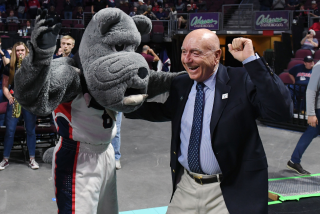Shultz Comes Back After His Bout With Hodgkin’s Disease
- Share via
WEST POINT, N.Y. — Ed Shultz has learned a new meaning to the football term “two-a-days.”
That’s because a major portion of Shultz’s winter “conditioning” program consisted of two 30-second blasts of radiation almost daily for cancer of the lymph nodes, alias Hodgkin’s disease.
Army’s 6-foot-4, 250-pound offensive tackle doesn’t have the familiar zipper scar on a knee or shoulder.
Instead, he has a vertical foot-long reminder that runs through his navel where his spleen was removed -- “They told me I didn’t need it anyway” -- and a much smaller one on the side of his neck where a swollen lymph node was removed for a biopsy.
Although he was allowed to attend about half of Army’s games last season and got to go home to Coatesville, Pa., for Christmas and New Year’s, Shultz was “stationed” at Walter Reed Army Hospital in Washington, D.C., from October until the middle of February. He underwent radiation “two-a-days” almost every weekday.
After starting every game in 1985, Shultz injured a shoulder in the 1986 opener, which turned out to be his only appearance of a season in which he was supposed to be the Cadets’ top lineman.
“One of the symptoms of Hodgkin’s is that you don’t heal as fast,” he says. “I jammed a finger the first week of practice and it just would not get better.”
Shultz missed Army’s second contest. On Sept. 27, he awoke in his hotel room, less than 12 hours before his scheduled return to action against Wake Forest, to find his neck had swollen from 19 1/2 to about 23 inches.
“I thought maybe I had caught a cold in the air conditioning,” he said. “I didn’t do anything right away because I didn’t feel like I was dying or anything.”
Trainer Gene Benner sent Shultz to the U.S. Military Academy hospital, where doctors found his white blood cell count was high but couldn’t determine why. Several days later, they shipped him to Washington.
“I was scared when they told me I was going to Walter Reed,” Shultz says. “I figured something was wrong and I didn’t know how to react. About a week later they did the biopsy.
“I had heard of Hodgkin’s disease, but I had no idea what it was. The first thing they said was that there was a good recovery rate as long as they caught it early. They were throwing out numbers like 85-90 percent.”
The doctors told Shultz he would undergo chemotherapy if the disease was confined below his diaphragm, radiation if it was localized in his neck and chest.
“I was scared,” he says. “I knew cancer could kill people, but I didn’t really think about dying. I just wanted to know how long it was going to last.
“What really helped me a lot was one guy who came to see me, a West Point graduate who was working in Washington. He said he had Hodgkin’s in the worst possible stage after he graduated. He had chemotherapy and radiation and he’s perfectly fine now.
“He said if anything, I’d get bored with the treatment. I was a lot calmer from that point on. And I got very bored with the treatment.”
Shultz still feels some of the effects of the radiation, although his voice has lost its scratchiness and his hair has grown back as long as the military allows it.
“My lungs were real beat up,” he says. “They’re only about 75 percent of capacity, and that hasn’t changed since February. The doctors don’t know if it will come back. Some people it does, some people it doesn’t.
“I still have a lot of trouble running. When I first came back, I couldn’t even walk up the stairs to the stadium.
“All the muscles are kind of weak in the areas where I had the radiation, my neck in particular. I’m having a little trouble sustaining my blocks.”
With Army’s opener against Holy Cross two weeks away, he has worked his way up to No. 2 left tackle on the depth chart.
“Strength-wise and stamina-wise, he’s maybe 80-85 percent of what he was,” says offensive coordinator Jim Shuck. “The touchy thing from a coaching standpoint is how much can we push him?”
Shultz missed almost all of spring practice, although he started running some. He is listed as a senior, but missed a half-year of classes and won’t graduate until December 1988, making him eligible to play next season, if he wants to.
“We’ll see how this year goes,” he says. “I know I can play almost as good as I used to.”
More to Read
Go beyond the scoreboard
Get the latest on L.A.'s teams in the daily Sports Report newsletter.
You may occasionally receive promotional content from the Los Angeles Times.










